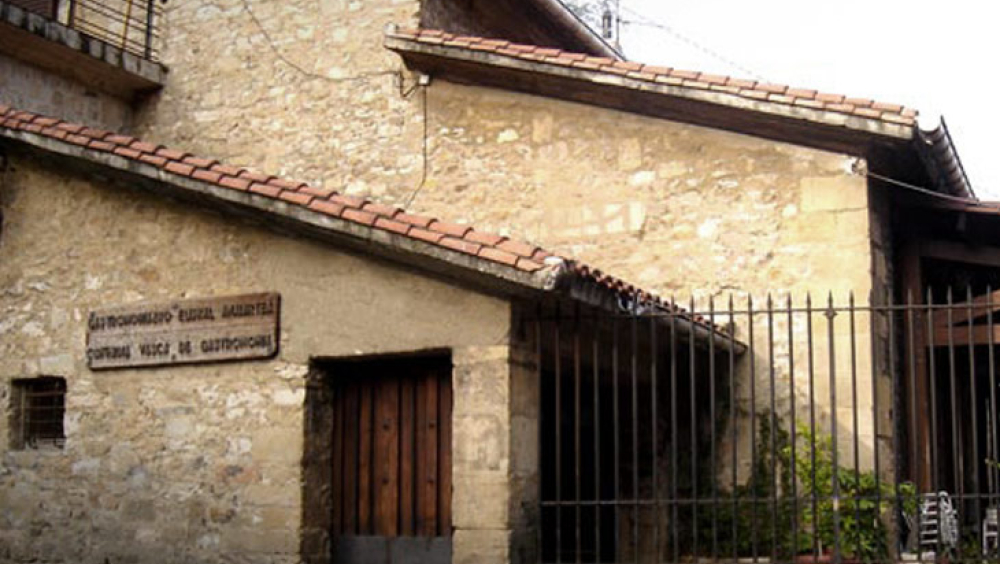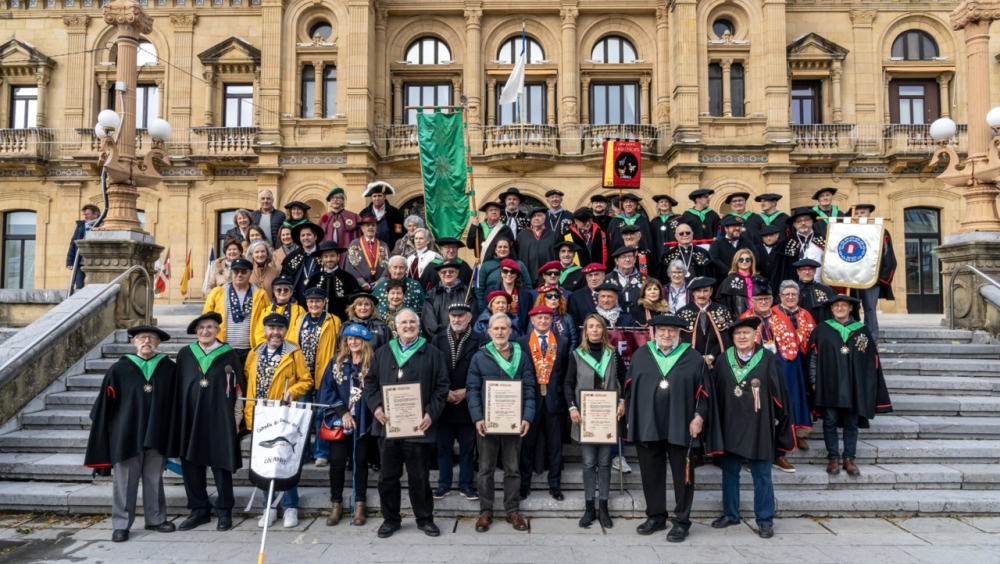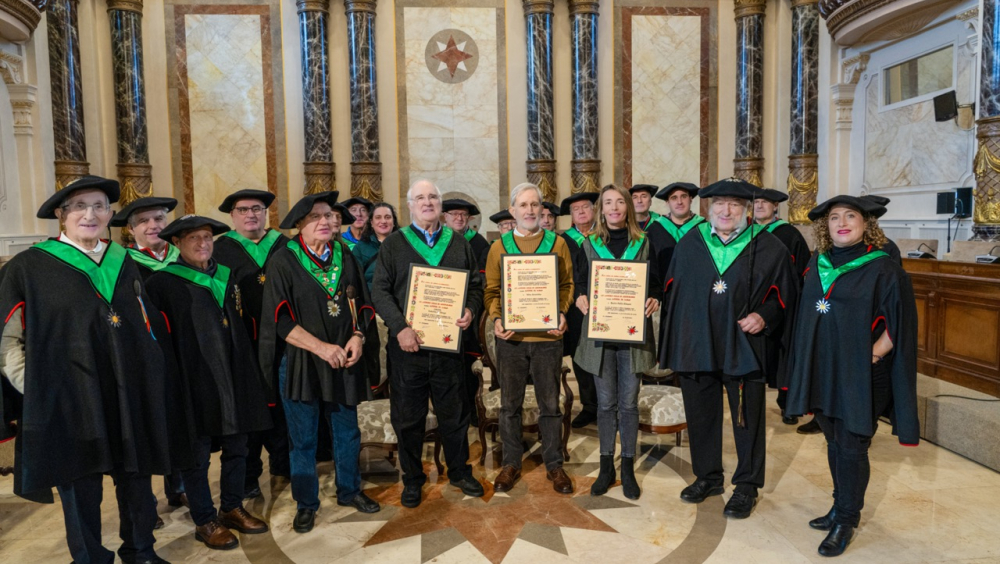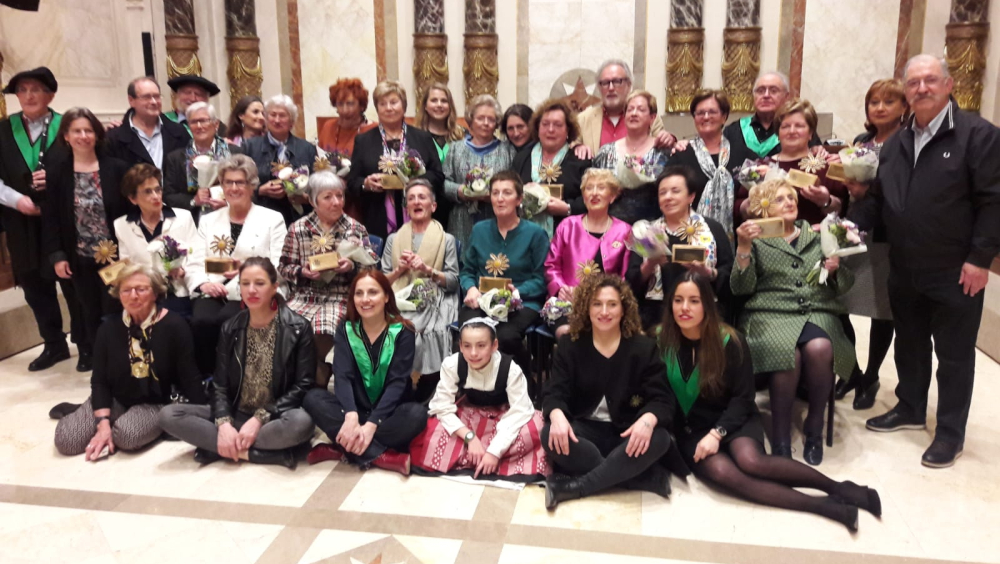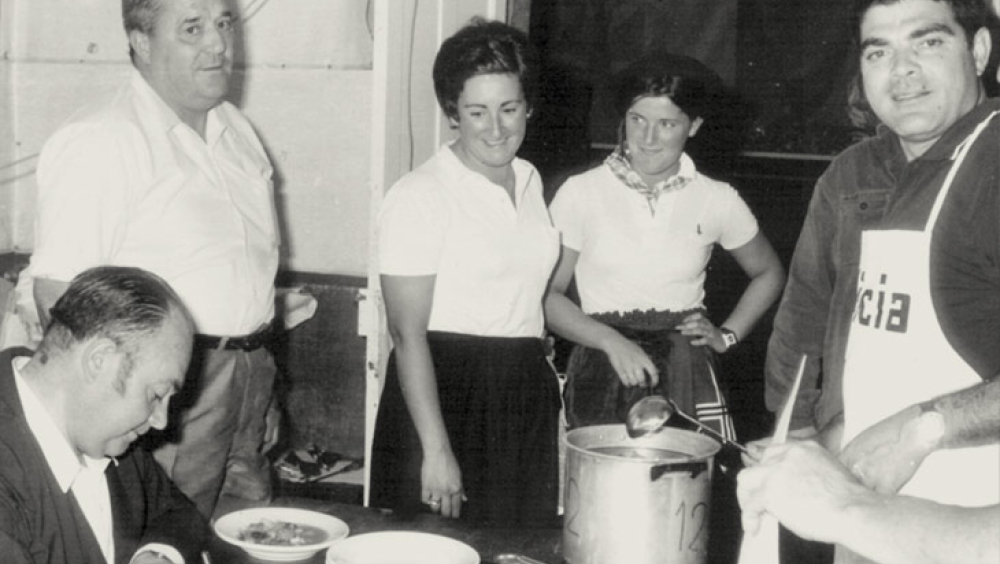The History of the Basque Gastronomy Brotherhood: A Passion for Culinary Heritage
The Basque Culinary Brotherhood, founded in 1961 in San Sebastián, was created with the goal of preserving and promoting the rich culinary tradition of the Basque Country. Its founders, a group of intellectuals, restaurateurs, and food enthusiasts, wanted to create a space where traditional Basque recipes, based on local ingredients and ancestral techniques, could be shared, appreciated, and passed down. In 1967, they succeeded in opening their own venue, establishing the Brotherhood as a key gathering place for culinary enthusiasts.
The mission of the Brotherhood goes beyond cooking; it seeks to preserve, educate, and innovate around Basque cuisine. They organize events such as festivals, workshops, and seminars, not only for professionals but also for the general community, fostering a deeper understanding of Basque food culture. Additionally, they have played a key role in the inclusion of women in a field historically dominated by men, promoting gender equality in gastronomy.
The Brotherhood has also been instrumental in the internationalization of Basque cuisine, establishing connections with other culinary organizations and bringing the region's food to a global audience. Prominent chefs like Juan Mari Arzak and Andoni Luis Aduriz, members of the Brotherhood, have taken Basque cuisine to a global level of recognition.
Today, the Brotherhood continues to be a fundamental pillar in preserving and spreading Basque gastronomy, combining tradition and innovation while keeping the culinary heritage of the Basque Country alive for future generations.
The History of the Basque Gastronomy Brotherhood: A Passion for Culinary Heritage
In the heart of the Basque Country, where the natural beauty of the mountains meets the Cantabrian Sea, lies San Sebastián (Donostia), a city renowned for its world-famous gastronomy. The region is not only known for its exquisite landscapes, but also for its deep-rooted connection to food. This bond goes beyond sustenance; it represents a celebration of culture, history, and identity. In 1961, the Basque Gastronomy Brotherhood (La Cofradía Vasca de Gastronomía) was born to preserve, promote, and elevate the culinary heritage of the region.
The Founding of the Brotherhood
The idea for the Brotherhood emerged after years of organizing culinary events in San Sebastián, where the founders realized that the core of Basque gastronomy was in the city’s Gastronomic Societies. In 1967, they established their headquarters, a place dedicated to preserving and celebrating the traditions of Basque cuisine. These founding members were not only passionate about food, but also about safeguarding ancestral recipes, local ingredients, and the communal nature of the culinary experience. They recognized the need to protect Basque cuisine in a rapidly changing world. The Brotherhood aimed to create a space where traditional culinary customs could be shared, appreciated, and passed down.
Moreover, the founders were eager to explore global culinary trends. Their experiences traveling and living abroad gave them a greater appreciation for their own culinary traditions. This also sparked a desire to educate the Basque people about other global cuisines, creating a cultural exchange that enriched their understanding of food.
The Brotherhood’s Mission: Preservation, Education, and Innovation
The Basque Gastronomy Brotherhood’s mission extends far beyond simply preparing delicious meals. It is centered around three key pillars: preservation, education, and innovation. Its members are committed to maintaining the region’s culinary history while introducing new techniques and ideas. This commitment extends to the folklore, history, and traditions surrounding food. The Brotherhood encourages those with knowledge and experience in the culinary arts to join its ranks and share their expertise.
The Brotherhood regularly communicates with its members through newsletters and a journal that features contributions from renowned gastronomes. This educational platform keeps members informed about seminars, courses, and culinary events while allowing them to contribute their own insights.
The Brotherhood’s Role in the Community
Over the years, the Basque Gastronomy Brotherhood has become a vital part of the cultural and social fabric of the Basque Country. It organizes annual culinary events, such as food festivals, cooking workshops, and educational seminars, designed to deepen the understanding of Basque food culture. These events are inclusive, drawing both locals and international visitors. The goal is to unite people through a shared love of food while also educating future generations about the importance of local ingredients and traditional cooking methods.
Guardians of Tradition and Innovation
What sets the Basque Gastronomy Brotherhood apart is its ability to blend tradition with innovation. While the Brotherhood’s roots are firmly planted in the past, its members are not afraid to experiment with new culinary techniques. They believe that true innovation arises from a deep respect for tradition.
Chefs like Juan Mari Arzak, Pedro Subijana, and Andoni Luis Aduriz—members of the Brotherhood—have taken Basque cuisine to new heights, revolutionizing traditional dishes with innovative techniques while staying true to the authenticity of local ingredients. San Sebastián has become a global epicenter of this culinary evolution, where the new Basque cuisine fuses respect for tradition with bold experimentation. This new wave of Basque chefs was inspired by figures like Luis Irizar, a guiding light for many of the region's top chefs.
Pioneers of Equality in a Male-Dominated Culinary World
Historically, Basque gastronomic societies were exclusively male. Women were largely excluded from participating in these culinary communities. However, the Basque Gastronomy Brotherhood has played a significant role in advocating for gender equality in the culinary field. It has created an inclusive environment where women’s contributions to the culinary world are recognized and celebrated.
One key figure in this transformation is Onintza, a passionate member of the Brotherhood. She has been involved since her youth, witnessing firsthand how women’s presence in the culinary world has grown over time. Her dedication to the cause serves as an example of how the evolution of Basque cuisine can also foster gender equality.
Culinary Experiences for All: Courses and Workshops
The Brotherhood is not just a space for culinary experts; it also opens its doors to anyone interested in learning about Basque cuisine. Through cooking courses, workshops, and seminars, the Brotherhood engages people from all walks of life, from amateur food enthusiasts to experienced professionals. These events provide a hands-on way for participants to immerse themselves in the flavors and techniques that make Basque food so unique.
These culinary experiences have attracted international visitors eager to learn how to prepare iconic Basque dishes such as merluza a la koskera (hake cooked in a traditional style) and txangurro (spider crab). More than just cooking, these events are opportunities to delve into the history, culture, and values that underpin Basque cuisine.
The Culinary Library: A Treasure of Knowledge
A major contribution of the Basque Gastronomy Brotherhood is its gastronomic library, the Biblioteca Internacional de Gastronomía Alejandro Dumas. This library houses a wealth of books, research, and cookbooks that trace the origins of Basque cuisine and its contemporary innovations. It is both a center of study and a source of inspiration for those wishing to understand the deeper connection between food, culture, and history.
Through this library, the Brotherhood preserves and transmits knowledge about Basque cuisine, ensuring that future generations of chefs and gastronomes continue to celebrate and safeguard the region’s culinary heritage.
International Impact
San Sebastián, home to many of the Brotherhood’s members, is often regarded as one of the culinary capitals of the world. Here, Basque cuisine is not only celebrated but presented to a global audience. The influence of the Basque Gastronomy Brotherhood extends beyond the city, however, as it has played a key role in elevating Basque culinary traditions internationally. The Brotherhood has established connections with gastronomic societies around the world, and its annual Capítulo event has become a prestigious gathering for chefs, gastronomic experts, and food lovers to exchange ideas and knowledge.
A Culinary Legacy for the Future
Today, Basque cuisine continues to be a global point of reference. The Basque Gastronomy Brotherhood remains a pillar in the preservation and promotion of the region’s culinary traditions, while pushing the boundaries of innovation. Chefs, both seasoned veterans and new talents, continue to elevate Basque cuisine on the global stage, ensuring that the flavors and techniques that have made Basque food famous are passed down to future generations.
The Brotherhood has proven that gastronomy can be a platform for inclusivity, diversity, and cultural exchange. Through its commitment to preservation, education, and innovation, the Basque Gastronomy Brotherhood continues to be a beacon for anyone seeking to connect with the soul of Basque cuisine.
As one of the Brotherhood’s founding members once said, “A meal is never just a meal; it is a story, a memory, a celebration of life.” This sentiment captures the essence of the Basque Gastronomy Brotherhood, inviting everyone to the table to share in the rich history and deep flavors of the Basque Country.
The Basque Culinary Brotherhood, founded in 1961, has a profound European dimension that goes beyond Basque gastronomy, connecting the common values that unite Europe: human rights, democracy, and the rule of law. The Brotherhood not only preserves and promotes Basque culinary traditions, making it a key candidate for funding to maintain its historic building. Also fosters exchanges between various European culinary cultures, enhancing mutual understanding and cooperation in building a more integrated Europe.
The Cofradía is more than a building—it is a vibrant space that encourages citizen participation and inclusion through activities like cooking workshops, tastings, and gastronomic events. These initiatives promote intercultural dialogue and strengthen ties between the local community and international visitors, fostering a shared sense of European belonging. It serves as a meeting point for visitors from the EU and beyond, including countries like Japan, the U.S., and Australia, who choose Donostia as a gastronomic destination. Events such as themed dinners and chef meetups enhance cooperation and mutual understanding.
One of the key aspects of this European dimension is how the Brotherhood organizes events such as the Chapter, which serves as a platform for chefs, experts, and food lovers from across Europe. These gatherings not only celebrate culinary diversity but also promote democratic values and mutual respect, which are essential for European cohesion. Through these events, the Brotherhood emphasizes the importance of solidarity and understanding between European nations, uniting local culinary traditions with European influences.
The Cofradía actively participates in the Tamborrada, Donostia’s emblematic festival commemorating the city’s resistance during the 1813 siege of San Sebastián. This celebration highlights European values like peace, unity, and cultural diversity. Additionally, the Cofradía recognises local producers and chefs, including those from the French Basque Country (Iparralde), emphasising cross-border collaboration and the European identity of Basque gastronomy.
Additionally, the inclusion of women in gastronomy, an initiative promoted by the Brotherhood, reflects the progress made toward gender equality, one of the core pillars of the European Union. The Brotherhood has been a pioneer in opening doors for women in a field historically dominated by men, aligning with the principles of fairness and justice that are fundamental to European integration.
Through its educational work and culinary library, the Brotherhood ensures that future generations can learn about the rich European gastronomic heritage, strengthening the sense of belonging to a shared culture. At the same time, Basque chefs, such as Juan Mari Arzak, Pedro Subijana, and Andoni Luis Aduriz, have taken Basque cuisine to the forefront, becoming ambassadors for a cuisine that, while preserving its authenticity, continuously engages with European and international culinary trends.
In conclusion, the Basque Culinary Brotherhood has a significant impact at the European level by promoting shared values like democracy, gender equality, and cultural diversity, while also bridging local culinary traditions with continental culinary movements, bridges local and European communities through its historic location and cultural activities. It deserves financial support to continue preserving and promoting Basque and European cultural heritage.
